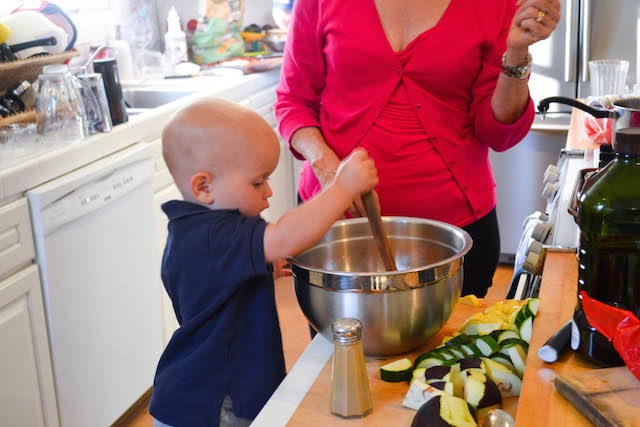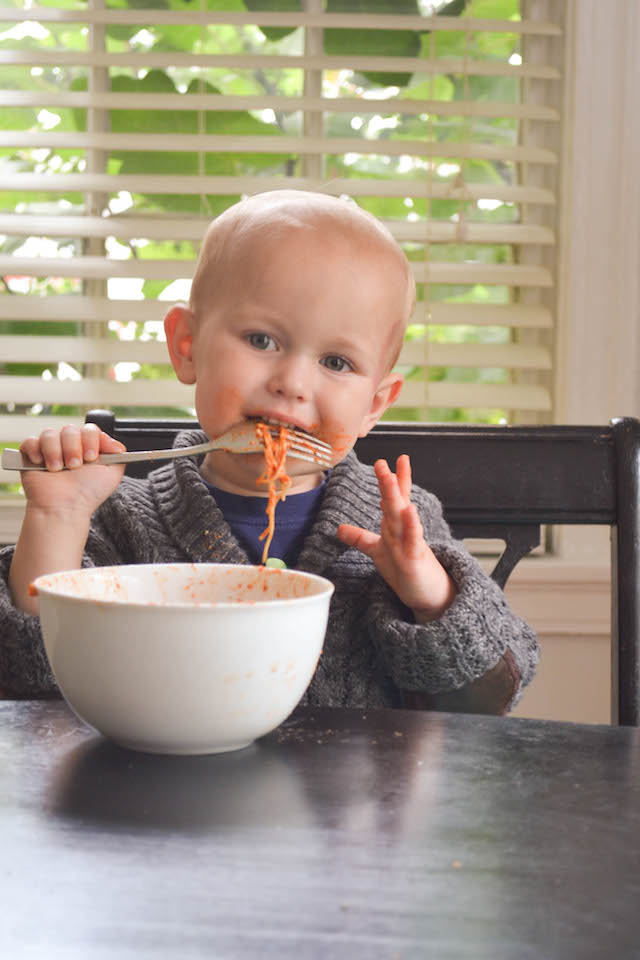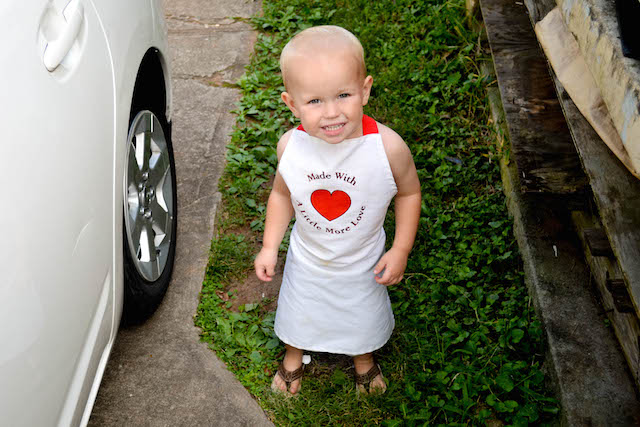When Marston was 14 months old, we were living in California. I didn’t try many adventurous foods with him because he’s a kid and adventurous foods aren’t kid-friendly, right? He was definitely going to be a picky eater. I thought if I got him to eat an apple and some blueberries I was doing good.

cooking dinner with Grandma Lynn
I wanted him to eat what Joe and I ate for dinner, but I also wasn’t interested in sitting at the dinner table till 8 pm every night until he finished his green beans. I didn’t think I could have both options. Everything I learned from North American culture is that every child is unique, and it was the rare child that ate everything put before them.
Then I found the book, French Children Eat Everything and it completely altered my approach towards feeding Marston.
At some point in the United States in the last 50 years, we started believing that children are picky eaters and instead of educating them on food, we needed to accommodate their pickiness. (Of course, there are some exceptions to this. Most likely though, your child is not the exception.)
Picky Eaters Consume 49 Pounds of Sugar Each Year
Children went from eating a wide range of foods, that occasionally included a sweet, to consuming 49 POUNDS OF SUGAR A YEAR. It’s no wonder that diabetes, heart disease and cancer are killing faster than we can keep up.
Through our expectations, we teach children that the only thing they will like is chicken nuggets and macaroni and cheese. We reinforce it with the children’s menu at restaurants and by using food as a reward for everything (this is also why I think eating disorders are rampant, but that’s a rant for another day).
The French have a different approach. They understand food the way they understand reading, it must be taught. Children ARE naturally picky eaters, it’s how they will stay alive if there is a mass plague that kills all the adults. It’s what keeps them from eating unknown berries in the woods (most of the time anyway).

Homemade tomato sauce and angel hair
ALL Foods are Kid-Friendly
But children can also learn to like all foods. In India, kids eat curry. One of my besties lives in Mexico City, her children eat cilantro and jalapenos. Kids the world over like flavor. In Europe there are no children’s menus. Our culture is the only one where we feed them hamburgers and french fries and expect nothing more. If children in Germany eat bratwurst and sauerkraut and like it, then I am absolutely going to teach my child that this is normal food.
And let me tell you, it works. Marston eats salad every night at dinner. He loves brussel sprouts and arugula and medium rare steak. Mushrooms and green beans are “real good” and he gobbles up braised chicken thighs with persimmons like it’s going out of style.
Of course if he had his druthers, he’d eat pizza for dinner—he’s still a kid. But, we’ve taught him that sautéed kale is yummy (well, we’re still working on this one) and he doesn’t get to eat a hot dog for every meal.
How to Give Your Kids a Food Education
If you’re interested in taking your child’s food education to the next level, I highly recommend this book. It gives specifics on how to do it (it’s written by a mom who did that very thing with her children after living in France for a year).
And this is not a “you don’t leave the dinner table until you finish your broccoli” approach either. It’s why you will never see a “kid-friendly” recipe on my website. I don’t believe that kids need “kid-friendly” food, I think they just need to be taught.
Giving my children the gift of learning to like healthy foods is one of the best things I can do for their long-term health.

He loves to wear this sweet little apron!
Here are four things you can do to help your normal recipes be kid-friendly recipes.
1. Don’t Beat Yourself Up
If your child only likes hot dogs or maybe, if the stars align, an orange, don’t worry, you’re not alone. This is true for most people in North America. Don’t feel discouraged. I wrote this blog, because I think there are a lot of other moms out there like me who think, “I want my kid to eat healthy foods and I want them to like it, I just don’t know how!” If you shame yourself you’ll only end up abandoning any changes you do make to avoid the bad feelings.
2. Change Your Expectations
Start by changing your thinking. Read French Children Eat Everything. Then, start believing that better is possible.
3. Get to Know Your Food
One of the simplest ways to improve eating is to cook more and eat fewer processed foods. Next time you’re at the store, read the list of ingredients on some of the food you’re buying. Processed foods are engineered to be delicious by reaching the bliss point—the optimal combination of salt, sugar and fat for flavor. Buy ingredients, not ready made food. This alone will make a big difference.
4. Help Your Child Get Interested in the Kitchen.
If you can teach your child to be comfortable in the kitchen, you set them up for success when they don’t have you to pick out cheerios covered in kale dust.
Fun Food Things for Kids
To help with that last one, here’s a short list of things that are fun for kids in the kitchen (I asked for that apple corer for Christmas one year, it was the coolest.)
Don’t worry about getting it perfect, just worry about getting it started. You’ll improve as you go. Make it your New Year’s resolution—you won’t accomplish it in a day, or even a month. But if you make it a long-term goal, you’ll make progress and form a lifestyle. I believe in you!
- Kids Chef’s Hat.
- Victorio Apple Peeler and Corer.
- Veggie Garden Maker.
- Butcher Striped Child Apron.
- Christmas Tree Ice Tray.
- Locomotive Cookie Cutter.
- Zoku Fish Pop Mold.
- Heirloom Children and Adult Cocoa Apron.
- Kid’s Felt Chicken Dinner Set.
- Citrus Press.
- Ravioli Rolling Pin.
- Alphabet Cookie Cutter Set.
- Handcrafted Elephant Stool.






This is your best blog ever. It needs to go viral.
ah shucks, thanks pops.
Great blog Tal! I couldn’t agree more – fabulous message to get out there and very well written!
Thanks Lisa! Thanks for always believing in me!:)
I love this. You always have the best book recommendations, too!
oh thanks andi! you’re so encouraging!
Thanks so much Talia for writing this post! I am putting that book on our Wishlist.
It’s so good. I think you will like it!:)
This. You put my internal struggle and my hopes for our food future into a beautifully written and encouraging piece! Well done! I’m excited to start! This was just the push I needed!!!
oh good, I’m so glad! the struggle is real, you can do it!
Love your little boy, so adorable!!
Thanks Brittany! He’s such a joy to raise (most of the time anyway:)
I thought all kids were perfect angels, LOL
right?:)
I just discovered your blog and look forward to exploring it. I love this post and agree wholeheartedly that American parents expect their kids to be picky and give in to it. I read the book Bringing Up Bebe, which is about an American raising her child in Paris (fascinating). It includes a section on foods. What a difference between French culture and ours!
I was born in New York City to parents who loved food. There was every kind of food imaginable in the city. I grew up eating pate on French bread, olives, cornichons, smoked mussels, pickled herring (okay, that last one wasn’t a fave) … all kinds of exotic foods! My mom, who was of French decent, was a great cook and I only had a brief period when I was very young when I only wanted to eat Genoa salami (and it had to be Genoa!). Otherwise I loved all kinds of foods. Still do to this day. I don’t have kids, but if I had, I would expose them to all kinds of foods at an early age. I also think limiting sugar is crucial. Once you develop that sweet tooth, everything changes.
I love Bringing Up Bebe (I read it while I was living in Paris!), it’s what inspired me to read more on French child-rearing etc. And what a heritage you were given! I love that you only wanted genoa salami! I hope my children have discerning tastebuds as well. 🙂 And I TOTALLY agree on sugar. We don’t always do the best job, but there is a marked difference when his sugar intake is limited (my 8 month old isn’t allowed it at all).